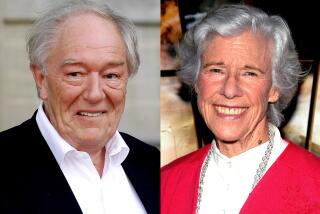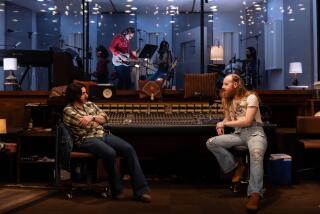Zoom plays? Sure, fine. But this theater critic doesn’t need more stories, not now
In a recent article for Vogue magazine on how the theater will survive the pandemic, playwright Matthew Lopez, author of the epic gay drama “The Inheritance,” made an assertion that I think deserves closer scrutiny.
“What is certain is that our hunger for stories has grown even more insatiable,” he writes, in a conclusion that attests to the enduring place of drama in our lives.
I don’t know about you but I feel surfeited with stories at the moment. With television streaming at us from every direction and electronic warehouses of books available for download with a click, I find the problem isn’t an insufficient supply of narrative but a deficit of attention compounded by an oppressive quantity of choice.
My own appetite seems to have diminished of late. Trapped at home, I would have thought I’d be binge-watching my way through the pandemic. But instead I’m nibbling at programs like a finicky cat, sniffing at whatever bowl is put before him only to indifferently turn away after a few bites.
I miss going to the theater, yet I feel little temptation to explore the libraries of performances that have been made available online. Many of the higher-profile offerings I’ve already seen in the theater. And as for the rest, well, no, I don’t particularly want to spend my evening watching a staged reading of “Hamlet” by an unknown company or a deconstructed classic by a renowned German troupe (with or without English supertitles). I have enough on my viewing plate and would rather not live glued to a screen, as though my existence were a cramped economy flight between birth and death.
Early in the pandemic, I texted a friend that I‘d finally discovered “I’m a Maslow’s hierarchy of needs guy.” I was responding, somewhat grouchily, to a sector of the theater community that was reacting as though the coronavirus crisis was most acutely experienced through the shuttering of Broadway theaters, the postponement of the Tony Awards and the dashed dreams of actors cast in now-canceled shows.
Sure, I was sympathetic to the stagehands and costume shop workers newly out of work. But no more so than I was to the taxi drivers, retail clerks and waiters who are similarly wondering how they’re going to make next month’s rent. Call me callous but the fate of our hospital system straining under the weight of desperately sick patients seemed more urgent to me than the budgetary death spirals of experimental theater companies.
In advising her friend and fellow poet Robert Lowell against incorporating his private marital letters into his poetry, Elizabeth Bishop conveyed a sentiment that is all the more striking for having come from one of the 20th century’s greatest American poets: “But art just isn’t worth that much.” She wasn’t by any means demeaning her life’s work. She was clarifying literature’s place in the moral universe.
The arts don’t trump all other values and obligations. Indeed, there’s a category for artists who believe their creativity should be prioritized in all weather: narcissist. Most in the theater community understand this and have used their platforms to advocate for causes beyond their narrow professional interests.
It was refreshing to hear Center Theatre Group managing director and chief executive Meghan Pressman at last week’s L.A. Theatre Speaks panel make the point that theaters should be lobbying their elected officials not for money (as there are more pressing needs) but for a seat at the political table. Rebuilding the cultural sector is going to take collective muscle, but first we must deal with the humanitarian crisis.
Storytelling isn’t in danger of going extinct, and if the last 2,500 years of theater history has taught us anything it’s that the stage cannot be suppressed. The financial misery ahead is unthinkably bad for both institutions and individuals, but this dire news isn’t exclusive to the arts.
As someone who has devoted his life to listening to tales told publicly in the dark, I’m surprised by how unmoved I am in this hour of need by Lopez’s assurance that storytelling is “a fundamental part of human nature.” Perhaps I’m turned off by the way the forces of mass production have co-opted this instinct and made narrative another canned commodity rolling off the Netflix and Amazon conveyor belts.
When writers wax sanctimonious about their contributions to human society, they sometimes lose sight of their own complicity in the cultural industrial complex. The higher-cause defense can seem glaringly at odds with the triviality of so much of the work.
My expectations were modest when I tuned in to the Public Theater’s premiere of Richard Nelson’s “What Do We Need to Talk About? Conversations on Zoom.” Set in the current pandemic, this new addition to Nelson’s Apple Family plays (directed by the author) was livestreamed on Wednesday and is available to watch for free via YouTube and the Public’s website through Sunday.
The previous four plays (anthologized under the subtitle “Scenes From Country Life” after Chekhov’s “Uncle Vanya”) follow a tightly enclosed dramatic format: The Apple siblings sit around a table in Rhinebeck, N.Y., and discuss the state of their lives. In a program note, Nelson wrote, “It is my hope that these plays are about the need to talk, the need to listen, the need for theater, and the need to be in the same room together.”
Being in the same room is no longer possible for audience members, and even the characters for the most part have to keep apart. Richard (Jay O. Sanders), a lawyer who’s been working in Albany for Gov. Andrew Cuomo and is ready for retirement, is at the home of his sister Barbara (Maryann Plunkett), a high school teacher who has just been released from the hospital after a scary bout of COVID-19. Their sister Marian (Laila Robins), an elementary school teacher whose daughter ended her life in suicide, is drinking wine and trying to stay in control. The youngest sister, Jane (Sally Murphy), a freelance writer trying to corral her fears, is holed up in her bedroom while her partner, Tim (Stephen Kunken), an actor and restaurant manager, is quarantined in the second bedroom as he recovers from his own brush with the illness.
The talk pretty much echoes the family conversations taking place on Zoom tic-tac-toe boards across the nation. How are you buying groceries? Who’s sick? Do you know anyone who died? What’s happening with work? How are you coping with the anxiety?
In holding the tape recorder up to our own small talk, Nelson risks a banality of the theatrical kind. The play, which I experienced after a long Zoom meeting of my own, initially made me question what Nelson thought he was accomplishing in offering a simulacrum of our repetitive pandemic dialogue.
The actors, grooved by years of ensemble work, give beautifully cohesive performances. And the abundance of theater references (including an anecdote about the actor Mark Blum, who died in March of complications from COVID-19) offers consoling company for the New York arts community. But it’s not until the true conversational subject of “What Do We Need to Talk About?” — death — emerges that the play takes artistic flight.
Of course the characters have trouble directly confronting what Henry James reportedly called “the distinguished thing” as it advanced upon him. Art provides a conduit to mortality. There’s discussion of “The Cherry Orchard” and an impromptu game (inspired by Boccaccio’s “The Decameron”) of telling stories to distract from the horror of the plague. But it’s Bach’s Mass in B Minor, which comforted Barbara while she was in the hospital, that creates a different register for shared consciousness as the music trickles from her phone.
Joan Didion began “The White Album” with the line “We tell ourselves stories in order to live.” The deeper truth might be that we tell ourselves stories because we must die. Nelson’s play, a hotline response to a national emergency, is a minor-key offering. But the experience reminded me that it’s not stories that I’ve grown weary of. It’s storytelling that avoids the fact of loss or manipulates and exploits it. Storytelling that pretends we have all the time in the world. Storytelling that has come to believe its own public relations.
Long live stories that tell us the unvarnished truth.
More to Read
The biggest entertainment stories
Get our big stories about Hollywood, film, television, music, arts, culture and more right in your inbox as soon as they publish.
You may occasionally receive promotional content from the Los Angeles Times.











